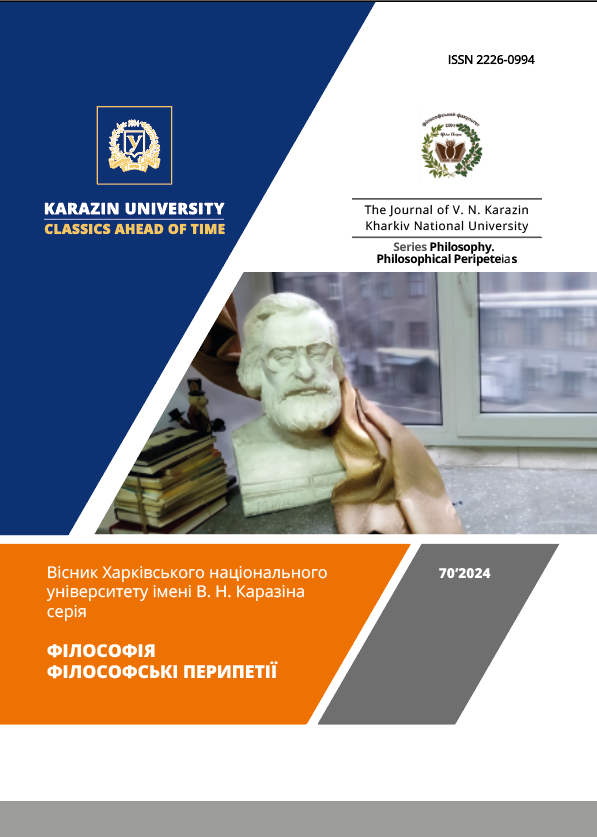THE THREE SOURCES AND THREE COMPONENT PARTS OF THE 'YOUNG MARX' MYTH
Abstract
The article presents the analysis of the concepts that were formed within the framework of the discussion about a "young Marx" in the 20th century, the totality of which, following the modern Marxist scholar M. Musto, is designated as the "young Marx" myth. The following main trends that serve as "sources" of this myth are distinguished: humanistic reduction (the direction whose representatives consider the "Economic and Philosophical Manuscripts of 1844" as the central text in the work of K. Marx); analytical teleology (the methodological approach, which is found mainly in the studies of Soviet Marxists, according to which the "truth" of Marx's "early" texts is recognized as "Capital", and the creative evolution of Marx is presented as a gradual unconscious growth of materialist and communist elements) and “an epistemological break" (the concept of L. Althusser, according to which there is a radical "break" between the "early" and the "mature" texts of Marx). It is noted that the above concepts are reducible and based on an arbitrary reading of Marx's texts. All of them proceed from the pre-given notion of the "mature" Marx, construct on its basis the image of "a young Marx", based on a certain unifying principle, and admit the existence of a "real", authentic Marx, the essence of which is most fully expressed in certain texts. The author emphasizes that Althusser's concept of 'epistemological break' most fully embodies the 'young Marx' myth while simultaneously containing the necessary conditions for its overcoming within a new approach to understanding the transformations of Marx's thought. Such an approach entails recognizing the multiplicity, openness, and incompleteness of Marx's critical projects; the need to trace the underlying lines between projects of different periods and the endeavor to construct a network of genetic connections among them; attempts to conceptualize not only the non-linear but also the unbreakable transformation of Marx's thought and the rejection of dichotomies such as unconscious/conscious, 'young'/'mature' etc., which becomes possible through an acritical, horizontal, and non-hierarchical reading of his texts.
Downloads
References
Althusser, L. (1971). Lenin and Philosophy and other Essays (B. Brewster, Trans.). London: Monthly Review Press.
Althusser, L. (1972). Marx’s Relation to Hegel. Politics and History. Montesquieu, Rousseau, Hegel and Marx (B. Brewster, Trans.). London: NLB, 161–186.
Althusser, L. (1976). Reply to John Lewis. Essays in Self-Criticism (G. Lock, Trans.). London: NLB, 33–100.
Althusser, L. (2003). The Humanist Controversy and Other Writings (G.M. Goshgarian, Trans.). London: Verso, 221–306.
Althusser, L. (2005). For Marx (B. Brewster, Trans.). London: Verso.
Althusser, L. (2007). L'avenir dure longtemps. Paris: Éditions Stoc.
Althusser, L., & Balibar, É. (1970). Reading Capital (Part 1) (B. Brewster, Trans.). London: NLB.
Anderson, P. (1976). Considerations on Western Marxism. London: Verso.
Aron, R. (1970). Marxismes imaginaires. Paris: Gallimard.
Burnham, D., & Lamb, P. (2019). The First Marx: A Philosophical Introduction. London: Bloomsbury.
Campbell, D. (2014). Louis Althusser and the End of Classical Russian Marxism: Spinoza, Hegel and the Critique of Dogmatic Marxism. Critique, 42(4), 527–553.
Carver, T. (2008). Marx's conception of alienation in the Grundrisse. In M. Musto (Ed.), Karl Marx’s Grundrisse: Foundations of the critique of political economy 150 years later (pp. 48–66). London: Routledge.
Fromm, E. (2004). Marx's Concept of Man. London: Continuum.
Garaudy, R. (1957). Humanisme Marxiste: Cinq Essais Polemiques. Paris: Éditions sociales.
Heinrich, M. (2019). Karl Marx and the Birth of Modern Society: The Life of Marx and the Development of His Work; Volume 1: 1818-1841 (A. Locascio, Trans.). New York: Monthly Review Press.
Lapin, N. I. (1986). Young Marx. Moscow: Publishing house of political literature. (In Russian).
Lenin, V. I. (1969). Complete Works. Vol. 26. Moscow: Publishing house of political literature. (In Russian).
Lenin, V. I. (1969). Complete Works. Vol. 29. Moscow: Publishing house of political literature. (In Russian).
Lenin, V. I. (1969). Complete Works. Vol. 33. Moscow: Publishing house of political literature. (In Russian).
Marcuse, H. (1972). The Foundation of Historical Materialism. Studies in Critical Philosophy (J. De Bres, Trans.). Boston: Beacon Press, 1–48.
Marx, K., & Engels, F. (2010). Collected Works. Vol. 29 [Digital Edition]. Lawrence & Wishart.
Marx, K., & Engels, F. (2010). Collected Works. Vol. 5 [Digital Edition]. Lawrence & Wishart.
Musto, M. (2010). Revisiting Marx`s Concept of Alienation. Socialism and Democracy, 24(3), 79–101.
Musto, M. (2015). The ‘Young Marx’ Myth in Interpretations of the Economic– Philosophic Manuscripts of 1844. Critique, 43(2), 233–260.
Oyserman, T. I. (1962). Formation of the philosophy of Marxism. Moscow: Publishing house of socio-economic literature. (In Russian).
Copyright (c) 2024 Михайло Любашевський

This work is licensed under a Creative Commons Attribution 4.0 International License.
Authors who publish with this journal agree to the following terms:
- Authors retain copyright and grant the journal right of first publication of this work under the terms of a license Creative Commons Attribution License 4.0 International (CC BY 4.0).
- Authors are able to enter into separate, additional contractual arrangements for the non-exclusive distribution of the journal's published version of the work (e.g., post it to an institutional repository or publish it in a book), with an acknowledgement of its initial publication in this journal.
- Authors are permitted and encouraged to post their work online (e.g., in institutional repositories or on their website) prior to and during the submission process, as it can lead to productive exchanges, as well as earlier and greater citation of published work.






3.gif)




